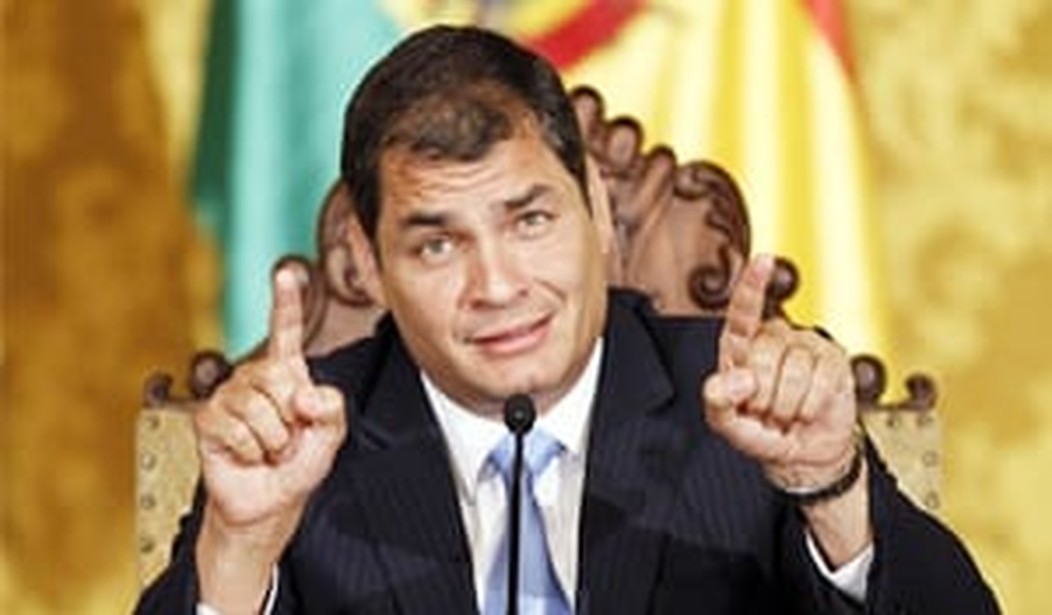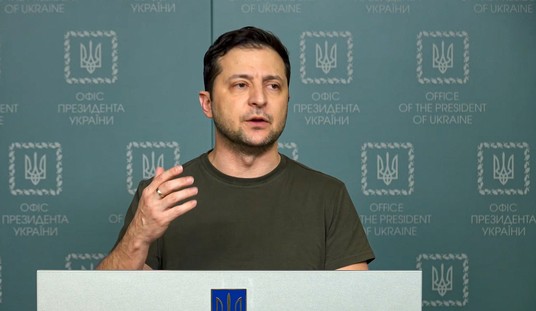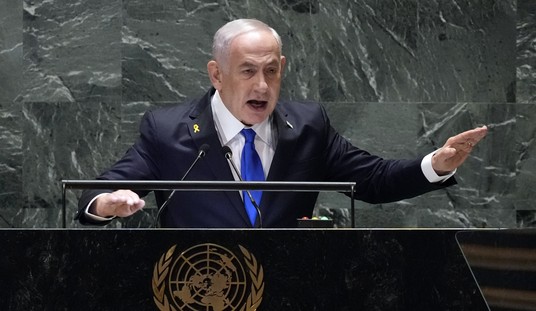Just call him Rafael… Chavez.
Ecuador’s leftist president, Rafeal Correa, signaled that he’s the next Latin American strongman-in-chief as he very publicly dismissed what Washington thought it held as leverage over Quito in making sure that NSA leaker Edward Snowden wouldn’t find refuge in the same country that granted asylum to WikiLeaker Julian Assange.
And yet Ecuador is still on the books to receive tens of millions of dollars in aid from Washington — though it wants to bounce some of that back in a “human-rights training” grant.
“Our government will not reward countries for bad behavior. If Snowden is granted asylum in Ecuador, I will lead the effort to prevent the renewal of Ecuador’s duty-free access under GSP and will also make sure there is no chance for renewal of the Andean Trade Promotion and Drug Eradication Act,” Senate Foreign Relations Committee Chairman Robert Menendez (D-N.J.) said on Wednesday.
“Trade preferences are a privilege granted to nations, not a right. I urge President Correa to do the right thing by the United States and Ecuador, and deny Snowden’s request for asylum,” he continued.
“The Obama Administration must let Correa know that his actions will have consequences and the Administration must not renew the trade preferences with Ecuador that expire next month,” said Rep. Ileana Ros-Lehtinen (R-Fla.).
No worries. Ecuador backed out of the 1991 treaty on Thursday, renouncing “in a unilateral and irrevocable way these trade preferences,” Communications Secretary Fernando Alvarado said at a press conference.
“Ecuador reminds the world that tariff preferences were originally granted as compensation to the Andean countries for its fight against drugs, but soon became a new instrument of blackmail,” Alvarado said.
The State Department brushed off Ecuador’s move.
“In terms of the trade relationship with Ecuador, I mean, those are really congressional, unilateral trade preferences granted by the U.S. Congress to Ecuador,” State Department spokesman Patrick Ventrell said on Thursday. “So I’m not sure that you can really withdraw from them one way or another, but we are Ecuador’s largest trade partner representing 35 percent of Ecuador’s total trade. That’s somewhere in the range of a $10 billion economic relationship, and so we are an important economic partner of theirs. And Congress has, going back since, I believe for a number of years, had these unilateral trade preferences.”
Prodded by reporters at the daily briefing, Ventrell tried to carefully walk around Quito’s nose-thumbing move and cautioned the media not to read too much into it. “Where we can have a positive economic relationship, that’s a good thing,” he said. “But I’m just not going to characterize the reaction.”
In a country where Correa has promised to build “socialism of the 21st century,” the government vowed to compensate producers of broccoli, tuna, and flowers who would be hardest hit.
Correa slammed “the insolence and arrogance of certain American industries that have lobbied to remove the tariff preferences for the Snowden case.”
To top it off, Ecuador offered the U.S. a $23 million grant so that we can conduct human rights training.
“Ecuador ofrece 23 millones anuales a E. Unidos para capacitar en respeto a D. Humanos, evitar torturas, ejecuciones extrajudiciales y otros,” tweeted Ecuador’s foreign minister Ricardo Patiño Aroca.
Correa got a public pat on the back for the double snubs from Hugo Chavez’s successor in Venezuela, Nicolas Maduro, during a ceremony at Miraflores Palace.
Praising his Ecuadorean “compañero” for being “brave” in the face of the U.S., Maduro said Correa could “count on us to go together for all the support they need.”
According to El Telegrafo, Correa declared that his country’s “dignity is priceless” so forfeiting the trade agreement didn’t matter.
“Ecuador is offering financial assistance to the U.S. …with the goal to provide training in human rights,” the president added. “Ecuador is not believed morally superior to any nation in the world …but we will not accept cynical double-standard filled positions that are based in neither reason nor truth.”
Ros-Lehtinen said “Correa saw the writing on the wall” after her warning and Menendez’s, and decided to cancel the trade deal.
“This unilateral act is further proof that Ecuadorian leader does not want close ties with the United States and only wishes to sabotage our bilateral relationship in order to save face following pressure from our government for Correa to refuse asylum to Edward Snowden,” she said.
The offer of funds for human-rights training, Ros-Lehtinen added, was “as if to add insult to injury.”
“This is perhaps the most laughable move by Correa to date, as it is he and his government who are in need of training in the protection and respect of fundamental basic human rights and democratic freedoms. This, after all, comes from the mini-Chavez who earlier this year launched an international campaign to weaken the Inter-American Commission on Human Rights, and who has consistently attempted to silence free speech and the independent media,” she said.
The congresswoman urged Obama “to send a clear message to Correa that his ill-considered actions will not go without consequences and reexamine all foreign aid that goes directly to this reckless government.”
Ecuador received more than $35 million in aid — military and police funds and development assistance — this year.
“We’re urging them not to grant asylum and to uphold the law,” Secretary of State John Kerry said in a Tuesday interview with CNN. “But let’s wait and see what happens. Again, I don’t know if [Snowden is] going to be in Ecuador, if he’s going to Ecuador. I don’t think anybody knows at this point. Let’s let this unfold.”
Since Congress held the purse strings of the trade agreement, the Obama White House that has dismissed its responsibility to even call the world leaders involved in Snowden’s escape will be eager to shift the blame for crumbling relations to the legislative branch.
Sen. John McCain (R-Ariz.) said his conversations with world leaders on his travels, particularly in the Middle East, reflect a global belief that “there’s no American leadership, and that’s correct.”
“I think it’s very clear that they believe that President Obama is not a player in the international scene, that President Obama, which has characterized his behavior, does not want to get involved or engaged in international security issues,” he said on Fox this week.
“The worst case scenario is, that Snowden somehow, they get him to Cuba and then to Ecuador where he will — like the WikiLeaks guy have some kind of immunity like the WikiLeaks guy has in the embassy in England,” McCain continued. “I think one of the places where we are is that I am confident that Russian and Chinese interrogators got a lot of information from Mr. Snowden. I cannot imagine them letting him go without rather extensive interviews. Whatever Mr. Snowden had or knew, I’m sure the Chinese or Russians know today.”









Join the conversation as a VIP Member